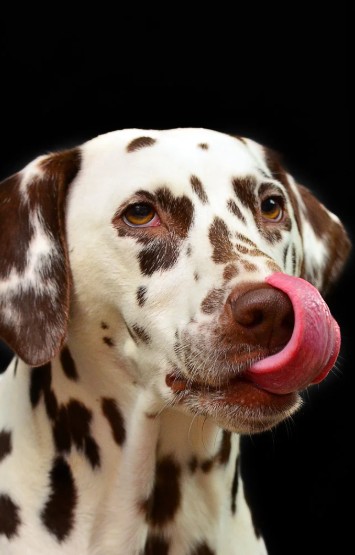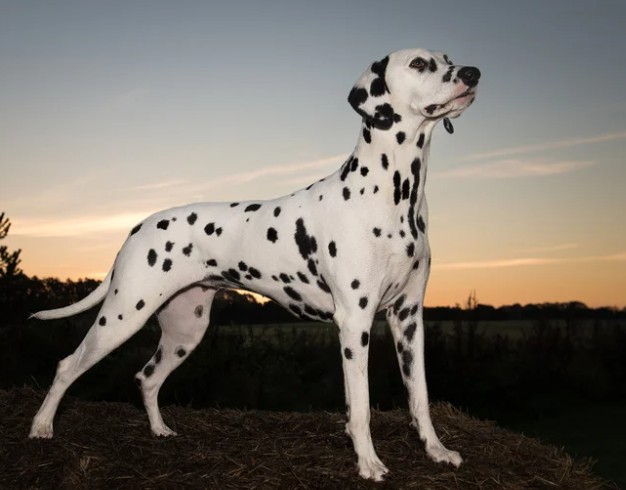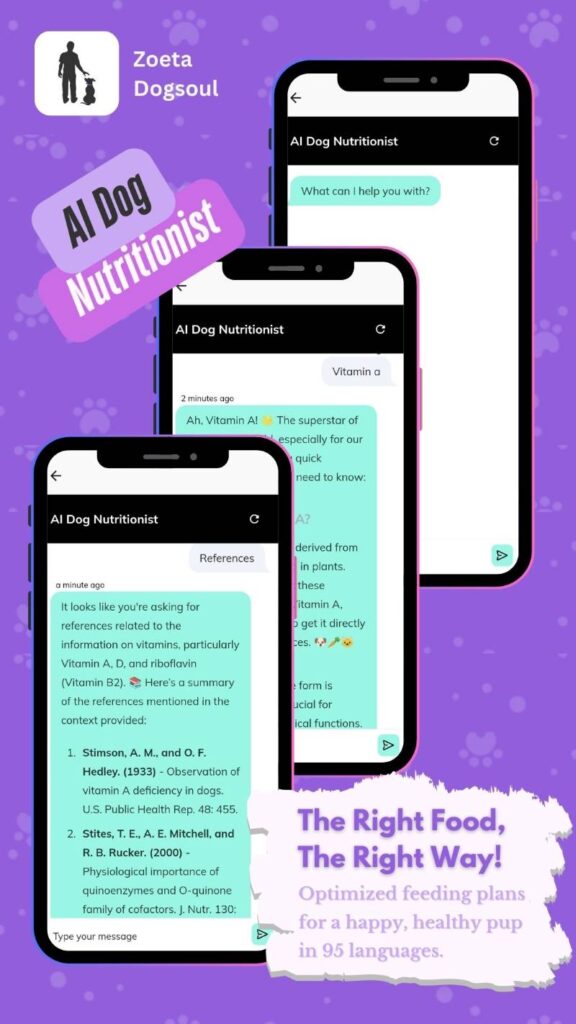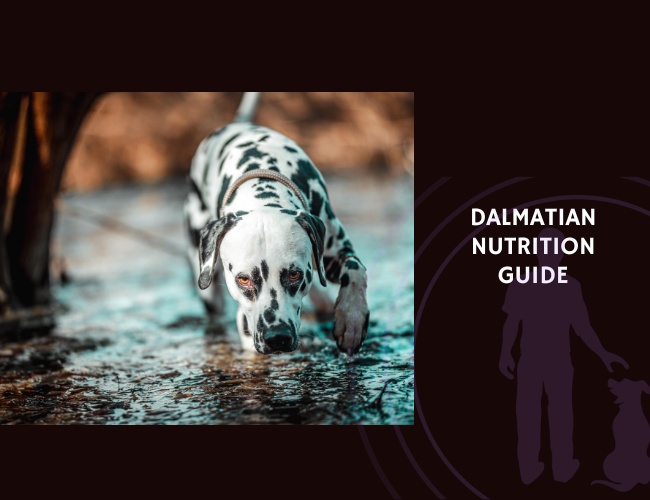From their distinctive spotted coats to their boundless energy, Dalmatians have captured hearts for centuries as both working dogs and beloved family companions. Yet beneath those iconic spots lies a unique metabolism that requires special nutritional attention – a fact that many Dalmatian parents discover only after encountering their first health challenge. Let us guide you through the fascinating world of Dalmatian nutrition, where understanding your dog’s specific needs can transform their health, vitality, and longevity.
Understanding Your Dalmatian’s Unique Metabolism
Discovering the genetic blueprint that makes your spotted friend special
Your Dalmatian’s metabolic system operates differently from most other breeds, a genetic quirk that dates back centuries. This unique metabolism affects how they process proteins and creates specific nutritional requirements that, when properly addressed, support vibrant health throughout their lifetime.
The Energy Equation: Dalmatians possess a moderate to high metabolic rate that fluctuates based on their activity level, age, and individual genetics. You might notice your Dalmatian seems to burn through energy faster than other dogs of similar size – this isn’t your imagination. Their metabolism runs like a well-tuned engine, requiring consistent, quality fuel to maintain optimal performance.
Digestive Efficiency: While Dalmatians generally demonstrate average digestive efficiency, individual variations can be significant. Some process meals quickly and efficiently, while others benefit from smaller, more frequent feedings. Understanding your specific dog’s digestive rhythm helps prevent common issues like bloating and ensures maximum nutrient absorption.
Weight Management Tendencies: Did you know that Dalmatians show a moderate predisposition to obesity? This tendency, influenced by both genetics and lifestyle factors, means that portion control and dietary quality become especially important. A lean Dalmatian is a healthy Dalmatian, and maintaining optimal weight prevents numerous breed-specific health challenges down the road. 🐾
Next, we’ll explore how to balance the essential macronutrients that fuel your Dalmatian’s active lifestyle…
Macronutrient Balance for Dalmatians
Building the perfect nutritional foundation for your spotted athlete
Creating the ideal macronutrient balance for your Dalmatian requires understanding how proteins, fats, and carbohydrates work together to support their unique physiology. Each component plays a crucial role in maintaining health, energy, and that characteristic Dalmatian vitality.
Protein Requirements: Your Dalmatian’s protein needs vary significantly throughout their life stages. Growing puppies require higher protein levels (around 28-32% dry matter) to support rapid development, while adults thrive on moderate levels (22-26%). Senior Dalmatians often benefit from slightly reduced protein (20-23%) to ease kidney function. The quality matters as much as quantity – look for easily digestible proteins from named meat sources.
Fat: The Energy Powerhouse: Fat provides concentrated energy and essential fatty acids crucial for your Dalmatian’s glossy coat and healthy skin. Adult Dalmatians typically do well with 12-16% fat content, while active or working dogs may require up to 20%. The omega-3 to omega-6 ratio deserves special attention – aim for a balanced 1:5 to 1:10 ratio to support anti-inflammatory processes and overall wellness.
Carbohydrate Considerations: While not essential, carbohydrates offer readily available energy for your active Dalmatian. The key lies in choosing low-glycemic options that provide sustained energy without spiking blood sugar. Sweet potatoes, brown rice, and oats make excellent choices, while high-glycemic ingredients like white rice or corn should be limited to prevent weight gain and metabolic stress.
Understanding these macronutrient needs sets the stage for exploring the equally important world of vitamins and minerals…
Essential Vitamins & Minerals
The micronutrients that make a macro difference in your Dalmatian’s health
Beyond the major nutrients, your Dalmatian requires a precise symphony of vitamins and minerals to support everything from bone strength to immune function. These micronutrients work synergistically, creating a foundation for lifelong health when properly balanced.
Critical Vitamins for Dalmatian Health:
- Vitamin E: Acts as a powerful antioxidant, protecting cells from oxidative stress
- Vitamin D: Essential for calcium absorption and bone health maintenance
- B-Complex Vitamins: Support energy metabolism and nervous system function
- Vitamin A: Crucial for vision, immune function, and cellular health
Mineral Requirements:
- Calcium and Phosphorus: These minerals must maintain a precise 1.2:1 ratio for optimal bone development and maintenance
- Zinc: Supports immune function, wound healing, and coat health
- Selenium: Works with Vitamin E as an antioxidant team
- Iron: Essential for oxygen transport and energy production
Trace Element Considerations: While specific imbalances aren’t documented as breed-specific issues, regular blood work helps monitor mineral levels. Pay special attention during growth phases, pregnancy, and senior years when requirements shift. Remember, more isn’t always better – mineral toxicity can be as harmful as deficiency.
Your veterinarian can recommend appropriate testing schedules to ensure your Dalmatian maintains optimal micronutrient levels throughout their life. 🧡
Now let’s address a topic that concerns many Dalmatian parents: food sensitivities and intolerances…
Common Food Sensitivities & Allergies
Recognizing and managing dietary sensitivities in your spotted companion
Food sensitivities can transform mealtime from a joy into a source of discomfort for your Dalmatian. Understanding common triggers and recognizing early warning signs helps you maintain dietary harmony and optimal health.
Primary Allergen Culprits: While Dalmatians don’t show breed-specific allergies, they can develop sensitivities to common canine allergens including:
- Beef and chicken proteins
- Dairy products
- Wheat and corn
- Soy-based ingredients
- Artificial additives and preservatives
Recognizing the Signs: Your Dalmatian’s body communicates food sensitivities through various channels. Skin issues often appear first – persistent itching, redness, or hot spots that don’t respond to regular treatment. Gastrointestinal symptoms like chronic soft stools, vomiting, or excessive gas also signal potential food intolerance. Some dogs experience ear infections or paw licking as their primary symptom.
The Elimination Diet Journey: If you suspect food sensitivities, an elimination diet provides the gold standard for diagnosis. This means feeding a novel protein (like venison or duck) with a single carbohydrate source for 8-12 weeks, then systematically reintroducing potential allergens. Yes, it requires patience, but identifying triggers transforms your dog’s quality of life.
Working with your veterinarian or a veterinary nutritionist ensures you maintain nutritional balance during the elimination process. Remember, this journey leads to a lifetime of comfortable, healthy eating for your furry friend.
As your Dalmatian moves through different life stages, their nutritional needs evolve significantly…
Life Stage Nutrition Guidelines
Tailoring nutrition to support your Dalmatian through every chapter
Your Dalmatian’s nutritional journey mirrors their life story, with each stage bringing unique requirements and opportunities to support optimal health. Understanding these transitions helps you provide precisely what your spotted friend needs, when they need it most.
Puppy Power (8 weeks – 12 months): Growing Dalmatian puppies experience rapid development that demands premium nutrition:
- Protein: 28-32% to support muscle and tissue development
- Fat: 15-20% for concentrated energy and brain development
- Calcium: 1.2-1.5% with proper phosphorus ratio for skeletal growth
- Feeding frequency: 3-4 meals daily until 6 months, then twice daily
Monitor growth rates carefully – Dalmatians should grow steadily, not rapidly, to prevent developmental orthopedic diseases.
Adult Maintenance (1-7 years): Your adult Dalmatian thrives on consistent, balanced nutrition:
- Protein: 22-26% for maintenance and activity support
- Fat: 12-16% for sustained energy
- Focus on weight maintenance and preventing obesity
- Two meals daily helps prevent bloat risk
Senior Support (7+ years): Aging Dalmatians benefit from thoughtful nutritional adjustments:
- Protein: 20-23% to ease kidney workload while maintaining muscle
- Enhanced omega-3 fatty acids for joint support
- Increased antioxidants for cognitive health
- Consider supplements like glucosamine and chondroitin
Reproductive Nutrition: Pregnant and nursing Dalmatians require significant nutritional support:
- Increase calories by 25-50% during late pregnancy
- Protein needs jump to 28-32% during lactation
- Calcium supplementation only under veterinary guidance
- Free-feeding often necessary during peak lactation
Each life stage presents opportunities to optimize health through nutrition. Next, we’ll explore how diet impacts breed-specific health concerns…
Spotted. Sensitive. Specific.
Every spot matters.
Dalmatians aren’t just visually unique—their metabolism tells a different story. Unlike other breeds, they require tailored nutrition to avoid preventable issues like urinary crystals and weight gain. Understanding their internal blueprint is the first step toward lifelong balance.
Fuel with precision.
What you feed fuels more than just movement—it shapes mood, muscle, and longevity. Dalmatians need controlled proteins, smart fats, and clean carbs. This isn’t guesswork. It’s strategic nourishment tuned to their biology and energy output.



Prevention is the point.
Urinary health, joint support, weight control—your Dalmatian’s needs are proactive, not reactive. Nutrition isn’t just maintenance—it’s protection. When done right, it’s quiet. When done wrong, it’s loud. You’ll hear it in their body before you see it in their eyes.
Nutritional Management of Breed-Specific Health Risks
Using diet as your first line of defense against common Dalmatian health challenges
Your Dalmatian’s genetic heritage brings certain health predispositions that thoughtful nutrition can help manage or prevent. Understanding these connections empowers you to make dietary choices that support long-term wellness.
Hip Dysplasia Prevention: While genetics play a primary role, nutrition significantly impacts hip dysplasia development and progression. Maintaining lean body condition reduces joint stress – even 10% excess weight increases dysplasia risk. During puppyhood, avoid overfeeding and ensure proper calcium-phosphorus ratios to support healthy skeletal development.
Bloat (GDV) Risk Reduction: Dalmatians face moderate bloat risk, but dietary management provides powerful prevention:
- Feed 2-3 smaller meals rather than one large meal
- Avoid exercise 1 hour before and after meals
- Consider elevated feeders (though research remains mixed)
- Limit high-fat foods that delay gastric emptying
- Ensure access to fresh water throughout the day
Pancreatitis Management: Some Dalmatians develop pancreatitis sensitivity, requiring dietary vigilance:
- Maintain fat content below 10% for affected dogs
- Choose highly digestible proteins
- Avoid table scraps and high-fat treats
- Consider prescription low-fat diets for chronic cases
Cardiac Health Support: With dilated cardiomyopathy (DCM) concerns in the breed:
- Ensure adequate taurine intake (found in meat-based proteins)
- Consider taurine supplementation under veterinary guidance
- Avoid grain-free diets linked to DCM in some dogs
- Monitor for early cardiac changes through regular check-ups
Remember, prevention through nutrition costs far less than treatment – both financially and emotionally. 🐾
Now let’s explore the practical aspects of choosing and implementing the right diet…
Choosing the Right Diet Type
Navigating the world of dog food options for your unique Dalmatian
The pet food aisle can feel overwhelming, with countless options promising optimal health for your Dalmatian. Understanding the pros and cons of each diet type helps you make an informed choice that fits both your dog’s needs and your lifestyle.
Commercial Kibble: The most convenient option offers consistent nutrition when you choose quality brands:
- Look for named meat proteins as first ingredients
- Avoid foods with excessive fillers or by-products
- Check for AAFCO compliance statements
- Consider grain-inclusive formulas with proven safety records
- Premium brands often offer breed-specific formulations
Raw Feeding (BARF/Prey Model): This biologically appropriate approach appeals to many Dalmatian owners:
- Provides natural enzymes and nutrients
- Requires careful balance of muscle meat, organs, and bones
- Demands strict hygiene protocols
- May improve coat condition and dental health
- Consult with a veterinary nutritionist for proper formulation
Home-Cooked Diets: Offering ultimate control over ingredients:
- Perfect for dogs with multiple sensitivities
- Requires dedication to proper balancing
- Must include appropriate vitamin/mineral supplementation
- Work with a board-certified veterinary nutritionist
- Batch cooking and freezing improves convenience
Combination Feeding: Many successful Dalmatian parents combine approaches:
- Kibble base with fresh food toppers
- Rotating between high-quality commercial foods
- Adding bone broth or goat milk for variety
- Incorporating healthy human foods as treats
The best diet is one you can maintain consistently while meeting your Dalmatian’s nutritional needs.
Let’s dive into the practical feeding strategies that maximize nutritional benefit…
Feeding Methods & Schedules
Creating mealtime routines that support health and happiness
How you feed matters almost as much as what you feed. Your Dalmatian’s feeding routine impacts everything from digestive health to behavior, making thoughtful scheduling and presentation crucial for optimal nutrition.
Optimal Feeding Frequency:
- Puppies (8-16 weeks): 4 meals daily
- Adolescents (4-12 months): 3 meals daily
- Adults (1+ years): 2 meals daily
- Seniors: May benefit from 2-3 smaller meals
This schedule supports stable blood sugar, reduces bloat risk, and maintains consistent energy levels throughout the day.
Portion Control Strategies: Your Dalmatian’s ideal portion depends on multiple factors:
- Calculate baseline needs: approximately 25-30 calories per pound of ideal body weight
- Adjust for activity level (working dogs may need 40+ calories per pound)
- Monitor body condition score weekly
- Use measuring cups or scales for consistency
- Remember treats count – they shouldn’t exceed 10% of daily calories
Addressing Common Feeding Challenges:
The Speed Eater: If your Dalmatian inhales meals:
- Use puzzle feeders or slow-feed bowls
- Scatter feeding on a snuffle mat
- Add large, smooth stones to the bowl (too big to swallow)
- Consider multiple small meals
The Picky Eater: For selective Dalmatians:
- Establish consistent meal times (15-20 minutes)
- Remove uneaten food without fuss
- Avoid constant diet changes
- Add warm water or bone broth for appeal
- Rule out dental issues or illness
Food Guarding: Address resource guarding immediately:
- Feed in a quiet, secure location
- Practice “trading” exercises with high-value treats
- Work with a certified trainer if behavior escalates
- Never punish growling – it’s important communication
Successful feeding routines create positive associations with mealtime while supporting optimal nutrition. 🧡
Now let’s explore how supplements can enhance your feeding program…

Supplements & Nutraceuticals
Enhancing your Dalmatian’s diet with targeted nutritional support
While a balanced diet provides the foundation, certain supplements can address breed-specific needs and support your Dalmatian through various life challenges. Understanding when and how to supplement ensures maximum benefit without creating imbalances.
Core Supplements for Dalmatians:
Joint Support Complex:
- Glucosamine (500-1000mg daily for adults)
- Chondroitin (400-800mg daily)
- MSM for anti-inflammatory effects
- Green-lipped mussel for natural joint support Begin supplementation early for prevention rather than waiting for problems.
Omega-3 Fatty Acids:
- Fish oil (1000mg per 30 pounds body weight)
- Supports skin, coat, and cognitive health
- Reduces inflammation throughout the body
- Choose molecularly distilled products to avoid contaminants
Probiotics and Digestive Enzymes:
- Support healthy gut microbiome
- Particularly helpful during diet transitions
- May reduce gas and improve stool quality
- Look for multi-strain formulations
Condition-Specific Supplements:
For Anxiety: L-theanine, chamomile, or CBD (under veterinary guidance) For Cognitive Support: SAMe, vitamin E, and medium-chain triglycerides for senior dogs For Urinary Health: Cranberry extract and increased water intake For Immune Support: Vitamin C, echinacea during stress periods
Supplement Safety Guidelines:
- Always introduce one supplement at a time
- Start with half the recommended dose
- Monitor for any adverse reactions
- Store properly to maintain potency
- Discuss all supplements with your veterinarian
Remember, supplements enhance but never replace a balanced diet. Quality nutrition remains your first and best investment in your Dalmatian’s health.
Let’s examine some real-world examples of successful nutritional management…
Practical Nutrition Guidelines for Dalmatian Owners
Your roadmap to feeding success
Translating nutritional science into daily practice creates the foundation for your Dalmatian’s lifelong health. These practical guidelines help you navigate common challenges while maintaining optimal nutrition.
Shopping Smart:
- Read labels carefully – ingredients list by weight
- Compare guaranteed analysis between foods
- Calculate cost per day, not per bag
- Buy appropriate bag sizes to maintain freshness
- Store food in airtight containers away from heat and light
Treat Guidelines:
- Limit treats to 10% of daily calories
- Choose single-ingredient options
- Use tiny pieces for training – it’s the reward, not the quantity
- Consider vegetables like carrots or green beans
- Make frozen treats with plain yogurt for summer
Water Wisdom:
- Provide constant access to fresh, clean water
- Change water at least twice daily
- Consider filtered water in areas with poor quality
- Monitor intake – sudden changes may indicate health issues
- Add water to dry food for increased hydration
Transitioning Foods Successfully:
- Allow 7-10 days for any diet change
- Day 1-3: 75% old food, 25% new
- Day 4-6: 50% each
- Day 7-9: 25% old, 75% new
- Day 10: 100% new food
- Monitor stools throughout transition
Red Flags to Watch:
- Sudden weight loss or gain
- Persistent digestive upset
- Changes in appetite or thirst
- Dull coat or excessive shedding
- Low energy or behavior changes
These signs warrant veterinary consultation and potential dietary adjustment.
Creating Your Nutrition Journal: Track your Dalmatian’s nutritional journey:
- Weekly weight and body condition scores
- Food brand, amount, and any supplements
- Treat types and frequency
- Any digestive issues or changes
- Energy levels and coat condition
This record becomes invaluable for identifying patterns and optimizing nutrition over time. 🐾
Conclusion: Is Your Dalmatian’s Diet Supporting Their Best Life?
Your Dalmatian’s nutritional needs are as unique as their spotted coat, requiring thoughtful attention to breed-specific requirements while honoring individual variations. From their distinctive metabolism to life stage transitions, every feeding decision impacts their health, happiness, and longevity.
Remember, optimal nutrition isn’t about perfection – it’s about consistency, observation, and adjustment. Your Dalmatian will tell you what works through their energy levels, coat condition, and overall vitality. Trust your instincts, work closely with your veterinary team, and don’t hesitate to make changes when needed.
Your Next Steps:
- Evaluate your current feeding program against these guidelines
- Schedule a nutritional consultation if concerns exist
- Begin tracking feeding and health metrics
- Join Dalmatian-specific nutrition groups for ongoing support
- Celebrate the small victories in your nutrition journey
You’re not just feeding your Dalmatian – you’re investing in countless adventures, quiet moments, and joyful years together. Here’s to the health and happiness of your spotted companion! 🧡🐾
For personalized nutritional guidance, consult with your veterinarian or a board-certified veterinary nutritionist who can account for your individual Dalmatian’s needs, health status, and lifestyle.










